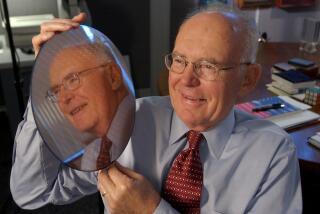Milton Mohr; Architect of Quotron Turnaround
Milton E. Mohr, former chairman, president and chief executive officer of the Los Angeles-based electronic financial data firm Quotron Systems Inc., who was credited with moving the company from near-bankruptcy to dominance of its market, has died at the age of 85.
Mohr died of cancer July 17 at his home in Malibu.
Founded as Scantlin Electronics Inc. in 1957 by John R. Scantlin, the company pioneered the use of computers in the securities world in 1959 when Scantlin invented an electronic device that could store and selectively retrieve stock market information on magnetic tape.
But by the time Mohr took over in 1970, the company retained only 4% of the securities information market and was on the verge of bankruptcy. Fortuitously for Scantlin Electronics, Mohr had resigned in a management dispute three months earlier as head of one of Scantlin’s major competitors, Bunker Ramo Corp. of New Jersey.
One of the first things Mohr did was change the Scantlin company name to that of its most important product, the Quotron, a computer system that displayed stock quotes, updated customers’ accounts and handled brokerages’ in-house data.
“I wanted to depersonalize it,” Mohr told The Times in 1979, nearly a decade after he engineered the name change. “And also, the company had a lousy reputation as a very clever company that never got anywhere--which is a good definition of it.”
The next thing he did, with Scantlin’s blessing, was to “sell” the company founder to Citibank as an advisor to help the bank establish its own computer data system and to adapt Quotron for the first time to banking purposes. In exchange, Mohr secured $6 million in fees and a $3-million line of credit.
Allan Raphael, vice president of the New York research firm Rooney, Pace Inc., in 1979 called Mohr’s feat “a textbook case of how to finance a company in this situation.”
As the new head of Quotron, Mohr quickly won a major new client, the then-largest brokerage house, Merrill Lynch, Pierce, Fenner and Smith, for a guarantee of $6 million of Quotron’s debt and warrants to purchase stock. Mohr further shored up the company by selling or writing off money-losing operations such as printers, cash registers and obsolete equipment. Under Mohr, Quotron provided its equipment cost-free to brokerages, charging them for its information services, which enabled Quotron to realize depreciation and investment tax breaks.
By the time Mohr began talks with Citibank to take over Quotron in late 1985, Quotron had rebounded to capture 70% of its market. He handled completion of the sale in 1986.
A graduate in electrical engineering of the University of Nebraska, Mohr worked in top secret cryptography during World War II. He later worked for Bell Laboratories where he obtained patents on about 30 inventions. He was one of the first employees of Thompson Corp., which became TRW.
A generous donor to his alma mater and to Caltech, Mohr served as president of Caltech Associates.
He is survived by his wife, Jane; two sons, Douglas and Larry; a daughter, Mary Ellen Marshall, and three grandchildren.
More to Read
Inside the business of entertainment
The Wide Shot brings you news, analysis and insights on everything from streaming wars to production — and what it all means for the future.
You may occasionally receive promotional content from the Los Angeles Times.








